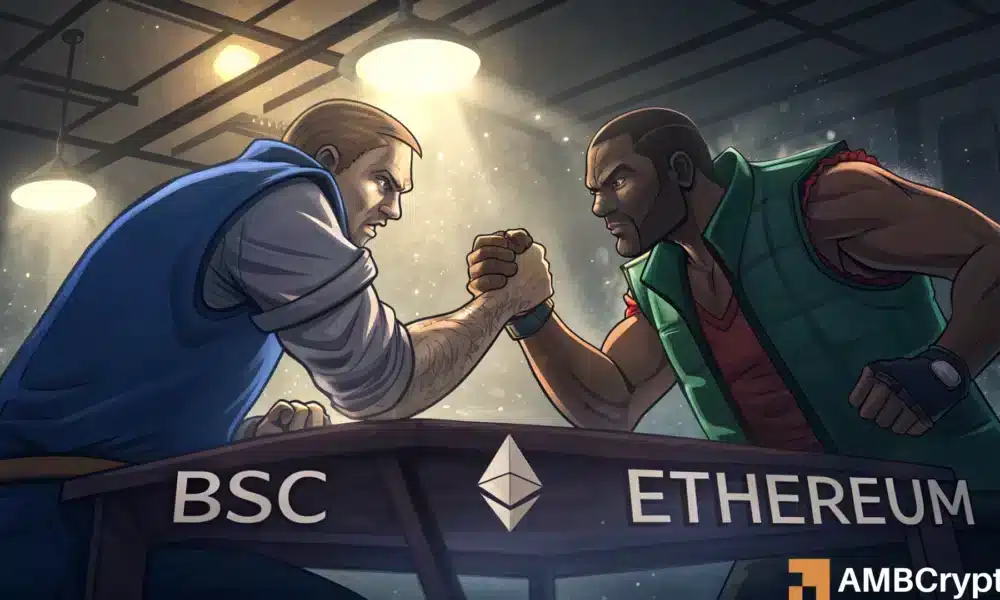BNB Chain Outpaces Ethereum in Block Production: A Deeper Look
The rapidly evolving blockchain landscape has brought forth a battle of performance and usability between major Layer-1 chains. Currently, BNB Chain (BSC) is taking the lead in block production, generating an impressive 115,200 blocks daily—an output that is nearly eight times that of Ethereum’s projected volume. This substantial performance gap raises a vital question: Does BSC’s raw throughput reflect greater on-chain traction and user engagement compared to Ethereum?
BNB Chain’s Maxwell Upgrade: A Leap Ahead
To gain a competitive edge, BNB Chain has implemented significant upgrades, notably the Maxwell upgrade, which has successfully reduced its block time from 1.5 seconds to just 0.75 seconds. This milestone not only enhances user experience but also positively impacts transaction throughput. By contrast, Ethereum’s developers are still in deliberation over a possible reduction in block time from 12 seconds to 6 seconds as part of the Glamsterdam upgrade expected in 2026. If Ethereum does indeed achieve this, it would still only produce about 14,400 blocks daily—far fewer than BSC’s astonishing output. The stats clearly illustrate BSC’s substantial advantage in transaction speed and frequency.
Impact on On-Chain Activity
BSC’s advancements in speed have translated into impressive on-chain activity metrics. The blockchain currently boasts 2.04 million active addresses, nearly five times that of Ethereum’s 411,000. Furthermore, decentralized exchange (DEX) volume on BSC reached a staggering $7.38 billion in just one day, overshadowing Ethereum’s $1.44 billion. This stark contrast points to a growing user base and a thriving DeFi ecosystem on BSC—highlighting that BSC’s rapid block production is fostering greater real-time usage and liquidity flow.
Value Locked vs. Activity: A Structural Disparity
Despite BSC’s apparent superiority in user engagement, it still trails behind Ethereum in terms of Total Value Locked (TVL) and protocol revenue. As of now, Ethereum remains the go-to platform for more capital-intensive and yield-bearing protocols. This structural difference highlights a clear distinction between the two networks: BSC is optimized for speed and scalability, while Ethereum continues to attract deeper financial engagement. Essentially, BSC may bring in rapid user activity, but Ethereum maintains its dominance in securing high-value DeFi interactions.
The Future of Blockchain Performance
Looking ahead, the competitive landscape between BSC and Ethereum is far from settled. If Ethereum’s Glamsterdam upgrade is successful in enhancing block times without compromising on decentralization, it may neutralize BSC’s current speed advantage. Such a development would tighten the race for dominance in the DeFi sphere, potentially leading to increased innovation and better user experiences across both networks.
Conclusion: A Balancing Act
In conclusion, BNB Chain’s Maxwell upgrade has put it at the forefront of block production and speed, enabling higher transaction throughput and user engagement. However, while BSC excels in raw activity metrics, Ethereum still commands a larger share of value and capital-intensive interactions. This complex balancing act between speed and value encapsulates the ongoing evolution in the blockchain space, as both networks strive to claim their stakes in the burgeoning Web3 ecosystem. As we look forward to future upgrades and innovations, the landscape will likely continue to shift, presenting new opportunities for users and developers alike.


